
by Valley Gadfly | Jun 23, 2023 | Main Articles
Apartment Buildup Wave Ripples Through District Also Facing Surge In New Office Buildings
by Glen Richardson
Cherry Creek North — long notable for ritzy shops, fancy restaurants, and posh homes — is about to feel the impact of a tidal wave of new apartment construction. The tsunami of new construction apparently triggered by Broe Real Estate Group’s announcement it plans to replace a 10-story office building at 50 S. Steele St. with a 12-story, 416-unit apartment building, groundbreaking to begin in early 2024.

High Tide On 1st Ave.: Broe Real Estate Group plans to replace its 10-story office building at 50 S. Steele St. with this humongous 12-story high-rise with 416 apartments.
The district, of course, had its first ominous hint of a powerful forward apartment construction wave when East West Partners announced it would build 600 apartment units in the largely vacant west end of the Cherry Creek Shopping Center. Near the Cherry Creek waterway shore, work at that site is also set to begin in early next year.
Adding to the ground swell of new apartments is BMC Investments plan to build a 12-story, 250-unit apartment building on the southeast corner of East. 1st Ave. and Steele St. (High Rise Apartments Going Up at Sears Store Site, Chronicle June).
Splattering Effect
Set to splash into Cherry Creek before or following the new year and ride the wave of new apartment projects to historic high-rise highs, are these earth-movement projects:
Zocalo Development is planning to build a 12-story, 185-unit apartment complex on the northeast corner of 1st Ave. and Steele St., their first project in Cherry Creek.
Stillwater Capital, a private national real estate firm, is planning an 85-unit apartment project that will replace several buildings in Cherry Creek North, at 255 N. Detroit. The tallest part of the building will be eight-stories, with step-downs to seven and five stories.
Formally an office proposal, Blair Richardson — CEO of Denver-based Bow River Capital — is now planning a five-story, 22 apartment-condo building at the vacant lot on the southwest corner of 2nd Ave. & Adams St., adjacent to the Cherry Creek Grill.
Broe Group’s Geyser

Building Boxes Rising: East West Partners plans 600 apartment units in the largely vacant west end of the Cherry Creek Shopping Center, near the Cherry Creek waterway.
The 416 apartment Broe development will have a humongous 611 parking spaces, plus ground-floor retail, and rooftop amenities. In 2021 when the site was rezoned for a 12-story structure, Cherry Creek East groups raised concerns about parking, traffic, and how a new building would block views.
Councilman Chris Hinds, who represents the district, also expressed concerns about the rezoning, particularly the impact it might have on older residents living at Kavod Senior Life around the block. But, nonetheless, he voted for the rezoning.
Broe has owned the 1970s-era, 115,325- square-foot building at 50 S. Steele St. since 1989. Elsewhere in Cherry Creek, Broe has two office developments underway at 200 and 250 Clayton St. The 200 Clayton site is in the final stages of completion. Broe plans to break ground at the 250 Clayton late this year.
Deluge At 1st & Steele
Zocalo’s new apartment building will be located on the northeast corner of 1st Ave. and Steele St., across the street from the 88

Splash On Steele St.: Zocalo plans this 12-story, 185-unit apartment complex on the northeast corner of 1st Ave. and Steele St., across from the 88 Steele Creek development.
Steele Creek development. Currently the site is just a dirt lot with some torn up pavement.
The 12-story LEED-Gold building will include their “Velo” bike room, a rooftop deck, fitness room, and ground floor retail.
Rezoning in April created a slight uproar concerning over-development and traffic congestion issues. Zocalo countered by offering $80,000 for bike and car sharing programs plus congestion relief measures.
Trio Slip Into Creek
BMC’s 12-story, 250-unit Steele Creek complex replacing the deserted Sears store, will be split, half one-bedroom, the other half divided between studio and two-bedroom units. Amenities will include a fitness center, rooftop deck, and landscaped courtyards.
Stillwater Capital’s 85-unit project on North Detroit will be eight-stories, stepped-down to seven and five-stories. Directly north of the eight-story Financial House, it will replace numerous retail sites including women’s store Garbarini.
The empty lot at 2nd Ave. & Adams St., originally planned as an office building, is being nixed in favor of a five-story, 22-unit apartment-condo project. Purchased by Bow River Capital’s CEO in July 2019, the site was bulldozed and has sat vaca

The Road Ahead: Cherry Creek West is changing Cherry Creek North Drive to be all at grade. A wide pedestrian crossing will allow walkers and bikers to cross freely.
nt for three years.
Housing Turbulence
In the past, apartments in metro Denver were simply four walls and a roof overhead, with few amenities. Renters viewed them as temporary shelter while they saved and searched for a starter home. That, however, has never been the case in Cherry Creek. Renters want luxury features like gyms, pools, walking paths, plus, of course, convenience to shopping and work.
The surge in apartment developments here reflects the overall turbulence in the housing market. The high-rise building wave is tapping into an exploding need for more housing options for everyone from millennials to empty nesters. Nevertheless, the magnitude of the apartment buildup is far beyond the most optimistic forecasts.
Still, amidst labor shortages, record-breaking inflation and unparalleled consumer demand, Cherry Creek has embraced the district’s construction buildup with grace. “At a time when other communities have struggled, we have continued to be the metro region’s economic powerhouse, and have exceeded our own growth expectations with grace,” is how Cherry Creek North’s CEO Nick LeMasters explains it modestly.
Soaking In Money Sway

Stillwater Floods Detroit: Stillwater Capital is planning an 85-unit project on North Detroit. The project will replace several retail businesses along Detroit St.
It’s hard to quantify an exact rent impact of the fast-paced buildup. As of June 2023, the average rent for a 1-bedroom apartment in Cherry Creek was $3,000, a 15% jump from the previous year. Rent for a 2-bedroom apartment was $4,790, a 2% drop.
With a median home price of $3,488,577 and a median rent of $1,696, Cherry Creek is Denver’s most expensive neighborhood. Furthermore, based on growth in home prices in Cherry Creek over the last three years, it ranks No. 1 among all Denver neighborhoods.
Metro Denver is losing people, and so is Colorado as a whole, and that has to be of considerable concern. Between January and March of this year Denver lost 4,200 people, according to real estate brokerage firm Redfin. That places Denver among the top 10 cities people are leaving the most.

by Mark Smiley | Jun 23, 2023 | Main Articles
Launch Pad Brewery Helps Sponsor The Most Recent Event On The Rooftop Of Carla Madison Recreation Center
by Mark Smiley
At a time in which many local chambers are struggling, the Greater Glendale Chamber of Commerce is expanding and thriving not only in Glendale but the surrounding communities as well. The most recent Business After Hours was held on June 6, 2023, on the rooftop of the Carla Madison Recreation Center in Denver.
Business leaders from throughout the Denver Metropolitan area flocked to the event to network and enjoy a sampling of Launch Pad Brewery’s beer. Launch Pad Brewery, located in Aurora, is part of the expanded reach, and they provided six different types of beer to sample. Launch Pad Brewery opened its doors on July 24, 2015, and has grown over the last eight years. They now have 32 beers on tap at their brewery. Launch Pad is located at 884 South Buckley Road. Learn more at launchpadbrewery.com.
As typical with these Chamber events, it was full of activities, including a putt putt golf challenge and ring toss. Pure Dermatology set up a booth and gave away packets of sunscreen and skin care products. They also held a drawing for two sun hats at the event. For more on Pure Dermatology, visit puredermdenver.com. Bartenders and waitresses helped keep the libations flowing and added a nice touch to this event.
The next two events are set for July 18 (Creekside Park in Glendale) and August 9 (Central Park Recreation Center). To learn more about the Chamber or to join, visit www.ggchamber.com or call 303-584-4181.
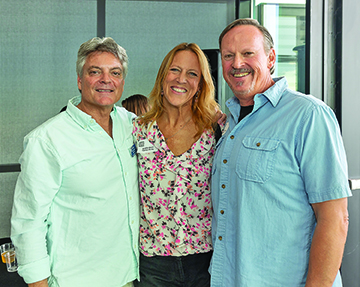
Barret O’Brien, O’Brien Rugby, left; Leslie Gross, Tac+on Ready; and Mike Gross, Tac+On Ready were among the attendees on June 6.
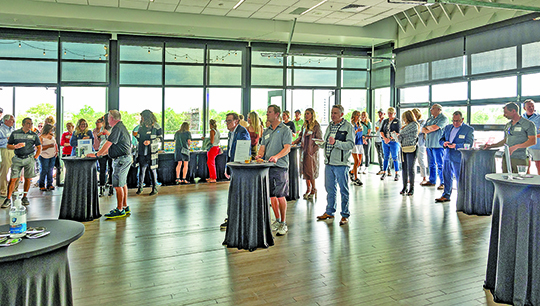
The rooftop of the Carla Madison Recreation Center on East Colfax was a well-received venue by the guests who attended.

Casey Bloyer, center, Distribution Manager for Launch Pad Brewery, pictured with Glendale Chamber hostesses Jesalyn Barnett, left, and Everyn Darling, was on hand to talk about the beers provided and answered questions from guests.

Guests enjoyed beers from Launch Pad Brewery on the sky deck of the Carla Madison Recreation Center.
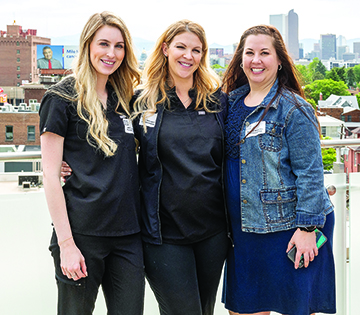
Left to right: Ashli LaMadrid, Katie Velasquez, and Bonnie Manzanres from Pure Dermatology had a booth at the latest Business After Hours on June 6, 2023.

Kal Thakor, MK Hotels; Everyn Darling, Noelle Talent Group; HP Padhiar, JPAD Liquors; and Jatin Padhiar, JPAD Liquors, enjoyed the view from the sky deck.

The Putt Putt Golf Challenge was on full display at the latest Business After Hours for the Chamber.
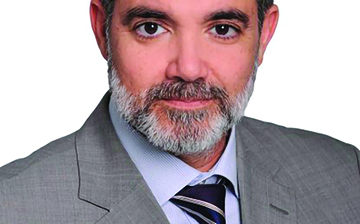
by Charles Bonniwell | May 22, 2023 | Main Articles
by Charles C. Bonniwell
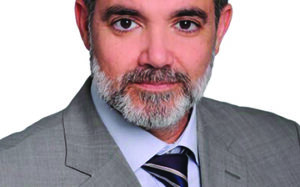
Bureaucratic Power Duo: Observers of the IEC have indicated the Executive Director Dino Ioannides, above, and legal counsel Senior Assistant Attorney General Gina Cannan, right, have filled the power vacuum left when Commissioner Bill Leone was not reappointed to the IEC. They in turn have carried on Leone’s vision of the IEC as an all-powerful entity to be used by insiders to crush political opponents.
 In 1902 the Colorado voters authorized home rule governance for municipalities by amending the state constitution and extended it to counties in 1970. It allows for municipalities and counties who adopt home rule governance to act and legislate on local matters and, in general, home rule ordinances addressing local matters supersede state law. Colorado’s Independent Ethics Commission (the “IEC”) under the control of the power-hungry New York lawyer Bill Leone decided it did not like home rule cities and counties having more power than it on local ethics matters, so starting in 2015 it began to scheme on methods to put the home rule towns, cities, and counties under its oppressive yoke.
In 1902 the Colorado voters authorized home rule governance for municipalities by amending the state constitution and extended it to counties in 1970. It allows for municipalities and counties who adopt home rule governance to act and legislate on local matters and, in general, home rule ordinances addressing local matters supersede state law. Colorado’s Independent Ethics Commission (the “IEC”) under the control of the power-hungry New York lawyer Bill Leone decided it did not like home rule cities and counties having more power than it on local ethics matters, so starting in 2015 it began to scheme on methods to put the home rule towns, cities, and counties under its oppressive yoke.
The plan was apparently to attack a small town, have it bend to the IEC overlordship, and then use that as precedent for its claim of power on all ethics issues over all home rule municipalities and counties. It was important not to attack a powerhouse like the City and County of Denver, which would have the influence and funding to fight off the rapacious IEC.
As disclosed in our prior front-page articles on the IEC, it takes only the cases it wants to take with little rhyme or reason other than increasing its power. It doesn’t want a lot of cases because it only meets once a month and has only one investigator (its Executive Director), so it restricts the cases to people and places it wants to attack, such as Secretary of State Scott Gessler, Governor John Hickenlooper, and it turns out, the City of Glendale.
2015 – The Saga Begins
Glendale was targeted because it is a small home rule municipality (population of 4,613) which has its own ethics code and complaint procedures which Commissioner Leone apparently believed would make a perfect target.
How Glendale came before the IEC was a labyrinth. In 2015 the city filed an Urban Renewal Plan for what is now known as “4 Mile District.” The owners of Authentic Persian Rugs on Colorado Boulevard, through an entity known as M.A.K. Investments, which owns approximately 3.8 acres along Cherry Creek wanted to build a massive condo building on this site which violated Glendale’s Zoning Code and Master Plan. Glendale residents nicknamed it the “Death Star Project.” The Persian rug merchants apparently believed with enough bullying they could get Glendale to bow to their plans.
Enter The FBI And The Oath Keepers
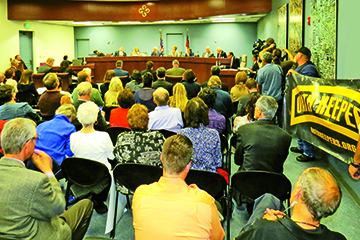
Jam-Packed: The Glendale City Council meeting of May 12, 2015, to reauthorize its urban renewal authority’s eminent domain powers was jam-packed by people brought to the meeting by Ali, Saeed and Nasirin Kholghy owners of Authentic Persian & Oriental Rugs. Residents of Glendale have accused the Kholghy family of attempting to bully and intimidate them by bringing in the paramilitary militia group the Oath Keepers whose banner is shown on the right.
In 2015, the rug merchants went to the state, local, and national press claiming that Glendale was going to use eminent domain to condemn the rug business and surrounding acreage for the project formerly known as the Glendale 180 project. (See Fight Over future of Glendale Persian Rug store heats up, Denver Post, July 2015.) Glendale believed that no assurances to the contrary mattered as the rug merchants were simply trying to pressure Glendale to approve the “Death Star Project.”
The rug merchants engaged the Oath Keepers, a feared rightwing paramilitary group, to engage in an armed “shock and awe” march on Glendale City Hall and threaten the City Council to accede to the rug merchants’ demands or face recall or worse.
At or about the same time the rug merchants began meeting with the Denver Office of the Federal Bureau of Investigation (the “FBI”) to encourage the FBI to investigate the City of Glendale on their behalf. It is widely believed that the FBI had infiltrated, and perhaps controlled, the Oath Keepers a long time ago. It is not clear if the FBI helped arrange or were involved inthe armed march to threaten Glendale City Council by the Oath Keepers.
What is known is that city officials began receiving suspicious proposals from previously unknown businessmen for what could possibly lead to potential bribe attempts. One well known Glendale businessman reported to City Hall that the FBI asked him to wear a wire and attempt to bribe the mayor which he refused to do stating the mayor was not going to take bribes.
Moreover, infamous undercover FBI agent Charles Johnson came to Glendale pretending to be a journalist and began harassing the city clerk and citizens who publicly opposed the “Death Star Project.” He went directly to the home of Glendale City Clerk Sherry Frame on the pretense that he had been “hired to look into an ethics complaint” against the mayor. The threats against the city clerk resulted in his arrest at the Denver International Airport. The FBI then intervened and got then Arapahoe County District Attorney George Brauchler to dismiss all charges against Johnson as a “professional courtesy.” D.A. Brauchler then publicly revealed what the FBI was up to. (See Trevor Anderson, How an Undercover FBI Agent Ended Up in Jail After Pretending to Be a Journalist, The Intercept, May 16, 2016.) The rug merchants were caught on camera meeting with FBI officials in a Denver restaurant.
The Rug Merchants’ Lawyers
– Ireland Stapleton

Secret Meeting: It has long been believed that Glendale rug merchants were in cahoots with the local FBI to force the City of Glendale to allow the building of a massive condominium complex on Colorado Boulevard and East Virginia. Such suspicions were supported by the above picture taken on October 6, 2015, at Panera Bread on Colorado Boulevard north of Yale. At the back of the booth, left to right, are FBI Special Agent Kimberly Milka, and FBI Special Agent Jonathan Grusing; at the front of the booth, left to right, are the owners of Authentic Persian & Oriental Rugs, Nasrin Kholghy, Mohammad Ali Kheirkhahi, and Saeed Kholghy.
The rug merchants also hired the law firm of Ireland Stapleton to file a series of lawsuits in state and federal courts to tie up the city in a legal quagmire. While the lawsuits were in motion, the rug merchants, hoping the city had been sufficiently softened up, demanded a meeting with the Zoning Department bringing with them an all-star development team that included Dana Crawford, the founder of Larimer Square, famous Denver architect David Tryba, and an RTD Director.
The meeting was openly taped with Crawford declaring “there is, you know there’s some sugar in it, a special sugar in it for the community…” When the tape was publicly revealed it was an embarrassment to the rug merchants and its team of developers. (See Wealthy Rug Merchants Plans Exposed, Glendale Cherry Creek Chronicle, March, 2016.)
Lawsuits Galore And Bernie Buescher
Glendale did not fold to the barrage of lawsuits and Glendale eventually prevailed in all of them. (See Rug Merchants Lose All Court Battles, Glendale Cherry Creek Chronicle, December 2016.) But the one legal move made by the Persian rug merchants’ attorneys that proved to be fruitful was to bring in attorney and former interim Secretary of State Bernie Buescher of Ireland Stapleton, an expert on how the IEC can bring down political opponents. For an organization that was able to bring to heel such powerful political players as Scott Gessler and John Hickenlooper, Glendale appeared to be an easy target.
First the rug merchants had a political hit group known as Ethics Watch to file ethics complaints in Glendale against then Councilman Jeff Allen and Mayor Mike Dunafon. The complaint was based on the seemingly specious claim that both were members of the Greater Glendale Chamber of Commerce and that the city utilized and paid the Chamber as its economic development arm. The second complaint against the mayor was for breaking a tie vote involving a final zoning approval for a business which the rug merchants claimed his wife was one of the shareholders. The problem with this complaint was that the woman was not his wife and moreover another vote was taken at the next meeting without his participation.
A hearing was held with an independent attorney who investigated the matter and presented the evidence to the City Council which in turn dismissed the complaints as frivolous.
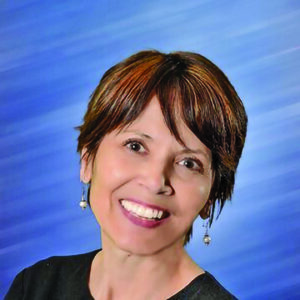
FBI Agent Arrested: Charles Johnson (left) allegedly harassed, stalked, and intimidated former Glendale City Clerk Sherry Frame, right, and individuals who wrote letters or were quoted in the Chronicle as being critical of Mohammad Ali Kheirkhahi or M.A.K’s proposed massive condo project on Colorado Boulevard. All charges were dropped and all warrants quashed in Arapahoe County Court per the request of the FBI “for reasons that cannot be disclosed.”
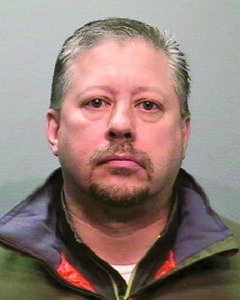 That would appear to be the end of the matter but the rug merchants legal counsel Ireland Stapleton filed the exact same complaint with the IEC. Ethics Watch refused to file it with the IEC as it did not believe it had jurisdiction in the matter as Glendale had adopted ethics rules, and as a home rule city those applied over the IEC. Leone, however was looking for a small home rule city it could crush with massive legal bills, just as it had with Hickenlooper and Gessler.
That would appear to be the end of the matter but the rug merchants legal counsel Ireland Stapleton filed the exact same complaint with the IEC. Ethics Watch refused to file it with the IEC as it did not believe it had jurisdiction in the matter as Glendale had adopted ethics rules, and as a home rule city those applied over the IEC. Leone, however was looking for a small home rule city it could crush with massive legal bills, just as it had with Hickenlooper and Gessler.
It took seven years for the IEC to find the first complaint against Allen to be frivolous, but not frivolous against Dunafon, although they were exactly the same. Apparently, the IEC found the mayor an easier target.
Eight Years Later
After hundreds of thousands in legal bills later, Glendale is still standing for the people of Colorado and home rule. After eight years of the IEC holding hours of closed-door deliberations and refusing to make records public, the IEC has finally set a hearing for August 15, 2023. However, the Executive Director Dino Ioannides refuses to inform Glendale attorneys what the hearing will exactly be on so it can prepare witnesses.
The Colorado courts have ruled that Glendale cannot appeal the question of whether the IEC has jurisdiction over home rule cities until after it has been fined or otherwise punished by the IEC. The fines that the parties are subject to are no more than a couple of hundred dollars. So just like in the Hickenlooper and Gessler cases Glendale is forced to spend hundreds of thousands of dollars to fight the IEC power grab over a miniscule potential fine.
Bureaucratic Takeover
Since the end of Bill Leone’s reign at the IEC in 2021, there has been a power vacuum at the IEC pursuant to which insiders believe the bureaucratic staff of Executive Director Dino Ioannides and Senior Assistant Attorney General Gina Cannan have filled the void. The two dominate the volunteer and inexperienced commissioners and carry on Leone’s vision of an all-powerful IEC to crush political opponents for those who know how to operate inside of the bureaucratic chamber of horrors.
Cannan in particular has raised the ire of IEC observers. While in theory she has the obligation to be neutral until an investigation has taken place she does not comply and lets her biases show from the very beginning. She was caught in briefs before the investigation saying “when Mayor Dunafon is fined” which assumed his guilt even before an investigation had even occurred.
Reporters, longtime observers, and critics of the IEC are expected to attend the August 15th Glendale hearing where they expect the bias of the IEC to be on full display, along with its unceasing unethical conduct for all to see.
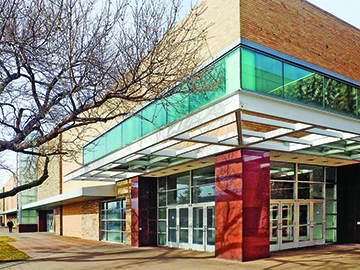
by Valley Gadfly | May 22, 2023 | Main Articles
The Eight Story $400 To $500 Million Project To Build 430 Apartments, Restaurants And Retail
by Glen Richardson

Curtain Call: The empty Sears building along 1st Ave. in Cherry Creek North is set for demolition. Construction is expected to begin in mid-2024, with completion in two years.
The unoccupied Cherry Creek North Sears building that has eluded development and sat empty since 2015, is finally going to hear the sound of trucks and construction equipment at work. After years of false starts, announcement that BMC Investments will improve and enhance the abandoned store site is electrifying news in the booming district.
Plans proposed by BMC’s Matt Joblon, founding partner & CEO, to create a “flagship centerpiece” on the 4.28-acre site intrigues and fascinates virtually everyone. Joblon — his firm has completed multiple apartment, hotel, and office projects in Cherry Creek North since 2013 — plans an eight-story multifamily complex. The site will also include 100,000-sq.-ft. of retail and restaurant space plus an “outdoor paseo” for entertainment. Initial site development plans have been submitted to the City & County of Denver by BMC.
Located along East 1st and 2nd Ave. between Clayton Lane and Josephine St. — one of the last developable sites in the district — demolition and new construction work at the site is expected to begin by mid-2024, with completion in two years. The Cherry Creek West project planned directly across First Ave. at the Cherry Creek Shopping Center, also expects to begin construction in mid-2024.
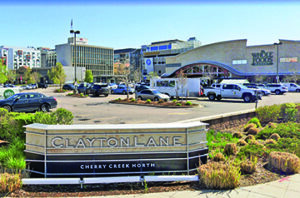 Development Firms
Development Firms
At the end of last year Atlanta-based Invesco Ltd. — now the sole owner of Cherry Creek’s Clayton Lane — selected BMC Investments and Los Angeles-based Prism Places to develop the property. Denver’s Tryba Architects — the same firm that designed the initial 9.5-acre Clayton Lane for Nichols Partnership 20-years ago — has been tabbed as the project’s architect. Employee-owned, Denver-based PCL Construction is the general contractor.
The development site includes the Crate & Barrel store on the corner of 1st Ave. and Clayton Ln. BMC and store officials are working through options for the site, including leaving the building untouched. If the decision is to demolish the building, architectural plans call for it to be replaced by a five-story mixed-use residential building, but the below-grade parking garage would be preserved.
To keep businesses, residents, and shoppers cognizant of changes ahead, here’s the Chronicle’s community guide for what to anticipate:
What’s Changing

Betwixt & Between: Crate & Barrel at 1st and Clayton Ln. is a slice of the makeover site. BMC and store execs are reviewing options. Architect’s draft shows a five-story residential building.
The old Sears store is being replaced by an eight-story apartment building with 430 studio, one-bedroom, and two-bedroom units.
In addition, 100,000-sq.-ft. of retail and restaurant spaces will be added. The units will range from 1,200 to 2,000-sq.-ft. Two of the spaces will be reserved for minority-owned art-retail units at more affordable rental rates.
The site will also include an outdoor courtyard-paseo designed for entertainment. From 100 to 200 events are planned per year. Live band concerts are expected to be included in the site schedule.
What Won’t Change
The Whole Foods Market at E. 1st Ave. & University Blvd. has a long-term lease and won’t be relocated or demolished. The store will stay in its long-established spot.
In addition, the five-story Clayton Lane Parking Garage next to Whole Foods won’t be taken down. Independent of Whole Foods customers use, the Clayton Lane condo owners will continue to have access. Furthermore, parking for nearby offices will endure.

Sears Saga: The Cherry Creek Sears store opened in 1954, part of what was once the largest U.S. retailer. Richard Sears and Alvah Roebuck issued their first catalog in 1891.
Development strategy is to follow current zoning, with no plans to request zoning variances. Moreover, structures east of Clayton Lane will not be changed or altered.
People safety remains the top priority for Clayton Lane and the Cherry Creek North community. People continue to feel safe in the district day or night — it’s a shopping sanctuary and safe neighborhood. Keeping it safeguarded is crucial, declares BMC’s Matt Joblon.
Street Enhancements

Clayton Lane Climax: BMC Investments to complete Cherry Creek’s Clayton Lane project launched 20 years ago. Swap of empty Sears store for high-rise, retail is planned on 4.28-acre site.
Restructuring of existing storefronts on Clayton Lane and 2nd Ave. are being designed to engage customers and create a charming, eye-catching street.
Store layouts will be updated into small- format floor plans preferred by boutique shops and restaurants. They are adjustments that impact performance and make spaces competitive. Interiors of ground floor retail spaces will be revamped and modernized; effective designs intended to dramatize the space and stimulate sales.
There is some unease that Cherry Creek North’s increasing density could create community character concerns. District density, however, will be somewhat offset by the planned outdoor courtyard. There’s also nervousness that building height limits — all buildings 8-12 stories in height — are causing the district to become monotonous.
Story Of Sears
The Sears store in Cherry Creek opened in 1954 after Sears closed its store in downtown Denver. The. Cherry Creek store on 1st Ave occupied 133,493-sq.-ft. and the adjacent Auto Center took up another 18,769-sq.-ft. The combined store and auto center at one time had 66 employees.
Sears declared bankruptcy in October 2018, resulting in the closing of Denver’s last two stores. They were located in the Southglenn Mall on S. University Ave. and in Lakewood’s Westland Center.
Richard Sears and Alvah Roebuck issued their first catalog containing 322 pages in 1891. The first Sears retail store opened in Chicago in 1925. At its peak, Sears was the largest U.S. retailer with 3,500 Sears and Kmart stores.

by Mark Smiley | May 22, 2023 | Main Articles
by Mike Wheaton

Springer’s unique fashion style matches the band’s unique sound.
Harry Springer is no stranger to the rock scene. He was the guitarist of the Colorado-based band The Midnight Club, which relocated to Los Angeles in 2020, hoping to find more opportunities for their music. But then the pandemic hit, and everything changed.
Springer found himself stuck at home, unable to play live shows or collaborate with other musicians. He decided to try creating songs for sound libraries, which supply music for movies and TV shows. He thought it would be an excellent way to earn money and practice his skills.
But something unexpected happened. As he was writing songs inspired by his idols like Jack White, Led Zeppelin, David Bowie, and T-Rex, he realized that he had a lot of things to say; thoughts that he didn’t want to give away to someone else.
“I sold some, and it was going fine, but then I wrote some songs, and I was like, ‘I don’t want to give these away,’” he says.
That’s how Moon Walker was born; a solo project that allowed Springer to express his political views, his sarcasm, his mysticism, and his love for fuzzed-out ‘70s rock. He played all the instruments, sang all the vocals, and produced all the tracks in his bedroom. He also recruited his friend Sean McCarthy to play drums on some songs.
The result was Truth to Power, a seven- track album that quickly gained attention on TikTok and earned praise from The Darkness’s Justin Hawkins. The album showcases Springer’s versatility as a songwriter and performer, from the catchy anthem “Tax the Churches” to the psychedelic ballad “The Attack of Mirrors.”
The songwriter and performer says that Moon Walker is what he was always meant to do. “I think this is what I was always getting towards, at least in my music-making journey,” he says. “I was always meant to sound like this and look like this. … It happened naturally in the context of the most unnatural thing ever.”

Moon Walker performs live at the Mercury Lounge in New York City.
Started Songs For Sound Libraries
The musician says he learned a lot from making songs for sound libraries. He had to follow specific guidelines and formats and adapt to different genres and styles. He also had to sign away any rights to his music when he sold it.
“It was a good exercise for me as a musician,” he says. “It helped me develop my skills and my ear. But it also made me realize I wanted more control over my music. “
Springer says he started writing more personal and original songs reflecting his influences and opinions. He says that he was influenced by the political and social turmoil of 2020 and wanted to make music that spoke to that.
“I wanted to make honest and raw music,” he says, “music that has a message and a purpose.”
Springer Drew From His Idols And Views
He grew up listening to classic rock bands like Led Zeppelin, David Bowie, and T-Rex. He says that he admired their creativity and their charisma, as well as their musical prowess.
“I love how they blended different genres and elements,” he says. “They were not afraid to experiment and try new things.”
He also looked up to Jack White, one of his favorite modern rock artists. He says that he was inspired by White’s guitar playing, his songwriting, and his attitude.
“He’s a genius,” he says. “He’s always pushing the boundaries of rock music. He’s also very outspoken and authentic.”
He wanted to emulate these artists by creating unique and distinctive music. He says he also wanted to infuse his music with his views and beliefs, often critical and sarcastic.
“I’m not a fan of organized religion or capitalism or any of the systems that oppress people,” he says. “I like to poke fun at them and expose their hypocrisy.”
Some of his songs have been misunderstood or misinterpreted by some listeners, who have accused him of being conservative or offensive. He says he uses sarcasm to convey his message, but some people don’t get it.
“I’m not trying to offend anyone,” he says. “I’m just trying to make people think and question things.”
 Plans To Keep Making Diverse
Plans To Keep Making Diverse
And Adventurous Music
He is not planning to stop making music anytime soon. He says he has already finished his second album, which he expects to release soon. He says the new album will be even more diverse and adventurous than the first one.
“I tried to explore different sounds and genres,” he says. “I have some peppier songs, some that are funkier, some that are heavier. I also have some songs that are more personal and emotional.”
Springer hopes his music will reach more people and inspire them to follow their creative passions. He wants to show that anyone can make music, even in difficult circumstances.
“I made this music in my bedroom with a laptop and a guitar,” he says. “I didn’t have a big budget or a big team. I just had a vision and a drive.”
He is grateful for the support and feedback that he has received from his fans and peers. He says he is always open to collaborating and learning from other artists. He says he is also looking forward to playing live shows again after the pandemic.
“I can’t wait to get back on stage and share my music with people,” he says. “I think that’s the best part of being a musician. ”
Moon Walker is not just a band name but a state of mind. He says that it represents his attitude and his philosophy of life.
“Moon Walker means being yourself, being free, being adventurous,” he says. “It means walking on the moon, where anything is possible.”
See Moon Walker Live
Larimer Lounge Presents Moon Walker with Annabel Lee on Tuesday, June 20. Doors open at 7 p.m. and show begins at 8 p.m. Cost is $15 per ticket for ages 16 and up. To purchase tickets online, visit https://www.etix.com/ticket/p/3229296/moon-walker-denver-larimer-lounge.

by Valley Gadfly | Apr 21, 2023 | Main Articles
With Colorado River Sapped By Drought, Denver, Suburbs Are Scrambling For Water
by Glen Richardson
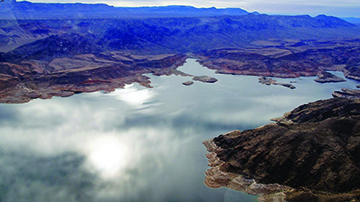
Lake Mead In Need: With the Colorado River at historic lows, Lake Mead Reservoir may not have enough water to generate hydropower, which would have a devastating impact on Denver.
Denver has a water crisis! The city and surrounding suburbs are running out of H2O. Why? Drought and climate change are draining the Colorado River dry. The river and watershed declined 20% this century. In 2021 the first-ever federal emergency water shortage declaration was declared. The lines of supply and demand for the Colorado River were crossed in 2000. Colorado and other western states were taking more water than the river had to give resulting in drainage of the two biggest reservoirs in the country, Lake Mead and Lake Powell.
It’s doubtful that all 1,450 miles of the Colorado River will turn to dust. But Lake Mead and Lake Powell are at historic lows. If water levels dip much lower, Colorado’s northernmost reservoir won’t have enough in the tank to both fill Lake Mead downstream and generate any hydropower, which would have devastating effects on the electricity grid to our city-state, plus a half-dozen other western states.
So far Colorado has been able to meet the water needs of Denver’s 5.8 million Front Range residents. But as the population surges while climate change escalates, Denver Water and suburban cities are suddenly scrambling to secure and shore up supplies. Denver Water gets about half of its supply from the Colorado River system. Water for more than one million homes on the Front Range could be lost and thousands of acres of farmland on the Western Slope and Eastern Plains may go dry. Remember, Colorado is also legally required to supply water to downstream states.
Water For Denver Water

Creek Flow Improved: A stretch of Cherry Creek that flows through Denver was restored at the end of 2021. Stormwater runoff and water quality was reestablished after eight-years of work.
Denver Water — the city’s chief water utility — collects rain and snow across a 4,000-square-mile area — capturing about 94 billion gallons in an average year. Since half of Denver’s drinking water comes from tributaries of the Colorado River on the west side of the Rocky Mountains — and the river basin has experienced a megadrought from the last two decades — the utility and the city are preparing for a future of increasing scarcity by diversifying water sources and ramping up conservation and efficiency efforts.
Summit County’s Lake Dillon Reservoir — Denver Water’s man-made and owned reservoir — is one of the largest sources of drinking water for Denver. With surging population growth in metro Denver, it may soon leave Dillon high and dry during most summers. Experts predict between 19 and 24 dry years during the next 26-year period. By late summer the utility begins piping water out of Dillon Reservoir via the Roberts Tunnel — a 23-mile pipe that runs under the Continental Divide and into the North Fork of the South Platte River — delivering it to Denver Water.
In June of last year, the city and county of Denver and the U.S. Army Corps of Engineers started moving forward on a $550.3 million project to improve the South Platte River and its tributaries. The work aims to restore a highly degraded river and boost habitat while reducing flood risks along the river. Also, a stretch of Cherry Creek that flows through Denver — between E. 6th Ave. on the North and Colorado Blvd. on the east — was restored at the end of 2021 after eight-years of work. The finished work improves stormwater runoff and water quality. Further, wildlife habitat and recreation were enhanced. In addition, Chatfield Dam — originally built for flood protection — is now also being used for water storage. Denver Water maintains a storage pool of more than 27,000 acre-feet. Water storage at Chatfield is also helping Centennial, Castle Rock, and Castle Pines supply their growing populations.
Serious Suburb Steps

Turf Tradeoff: Denver and suburban cities are focusing on turf replacement plans as the next reservoir of water. Adoption is just beginning but it’s seen as the cheapest, fastest, most reliable new supply.
Denver’s suburbs — the center of housing sprawl — continue to boom, creating a scramble for sustainable water supplies as they realize that they’re running out of water. Communities such as Aurora, Arvada, and Castle Rock are taking serious steps to meet current demands, recognizing that water supplies are likely to worsen. They face higher water prices, dwindling supply, plus older collection and treatment systems.
Aurora no longer allows grass in medians or decorative spots at offices, plus no home lawns front or back. Aurora has also banned new golf courses. Aurora Water will buy existing turf plus design a low-water garden for free, and pay material costs up to $3,000 for 500-sq.-ft. Arvada has yet to ban turf but has doubled connection fees. Fast-growing Castle Rock, however, has banned turf in front yards of new homes and is offering developers steep fee discounts for water-saving. Without a turf ban, Denver Water is working with the city on updated building codes that may result in stronger turf limits. Denver is also considering a cap on irrigation at 7.5 gallons of potable water per square foot.
Lastly, a new turf replacement program is set to roll out statewide this year. It will pay homeowners to convert some of the grass in urban and residential yards into more water-efficient landscaping. It is the first time the State of Colorado had dedicated funds expressly to turf replacement. The bottom line: Denver and Colorado are focusing on turf replacement programs as the city-state’s next reservoir of water. For the foreseeable future it is likely to be the cheapest, fastest, and most reliable form of new supply.
The Heat Is On
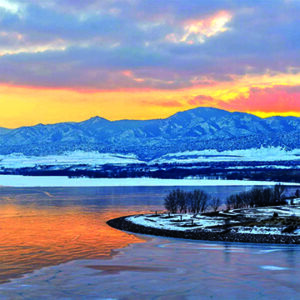
Chatfield Storage Space: Built as a flood shield, Chatfield Dam is now used for water storage. Denver Water keeps 27,000 acre-feet. Centennial, Castle Rock, and Castle Pines also save water.
Average temperatures in Denver and statewide have increased by 2.0°F over the past 30 years, according to the Colorado Water Conservation Board. However, heat waves are becoming more common, snow is melting earlier in spring, and less water flows through the Colorado River.
Furthermore, the frequency and intensity of heat waves are increasing even in places with cooler average temperatures. Warmer temperatures will affect evaporation rates in our rivers, streams and reservoirs, possible making less water available for beneficial use.
Recent wet weather hasn’t ended the drought, and won’t cure the driest period in the past 1,200 years. Moreover, researchers say the state is likely to see 50% to 60% less snow as the next century approaches. Less stream flow in Colorado probably also means the Centennial State will increasingly look more like Arizona and New Mexico.
Trio Of Neighboring Cities Face Dire River Reckoning
As Valley communities scramble to meet the needs of residents as water withers in the Colorado River, a proposal by the Biden Administration would almost entirely cut off river deliveries to Phoenix, Tucson, and Las Vegas. That’s the option unless California agrees to proposed equal cuts for all three Colorado River basin states. The proposals give Secretary of Interior Deb Haaland authority to cut water use on the river.

































